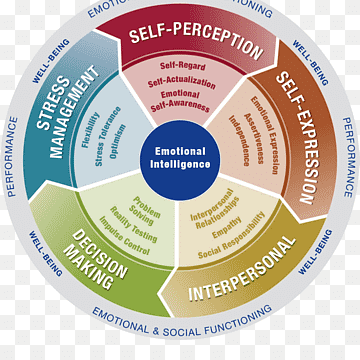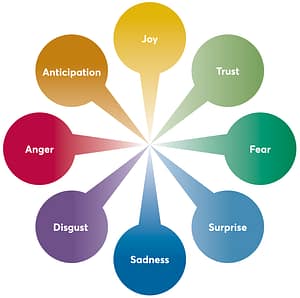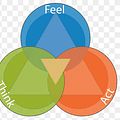The role of emotions in today’s workplace cannot be denied.
In present-day workplace culture, where much importance is attached to being yourself and realizing your potential fully, it is imperative for supervisors Managers, and Leaders to understand emotions in the workplace and manage them effectively to build a healthy and productive work environment for more success and prosperity for all.
If you are an Aspiring /New Manager or Leader, you will benefit from reading this post.
The purpose of this post is to help you gain insight into :
-
What are the Emotions-The Science behind it .
-
Why it is important to know about the Emotions .
-
How Emotions arise -The Source of Emotions.
-
The Process Of Emotions -How Emotions affect our Actions and Behaviour .
-
8 Basic Emotions you must know about.
WHAT ARE THE EMOTIONS -THE SCIENCE BEHIND IT
An emotion, is a complex experience of consciousness, bodily sensational, and behavior that reflects the personal significance of a thing, an event, or a state of affairs.-Britannica
“Emotions,” wrote Aristotle (384–322 BCE), “are all those feelings that so change men as to affect their judgments, and that are also attended by pain or pleasure. Such are anger, pity, fear, and the like, with their opposites.”
Psychologist Elizabeth Fedrick defines emotions as a combination of three elements: a unique internal experience, which often leads to a physiological response, and then ultimately a behavioral reaction.
Emotions are a conscious change in a person’s behavioral and mental state in response to a stimulus -external ( an interaction or an event ) or internal ( a thought or physical sensation.).
Whether the stimulus is external or internal, it results in a shift in one’s physiological and mental state of well-being.
WHY IT IS IMPORTANT TO KNOW ABOUT EMOTIONS
You must be wondering why it is important to know about emotions.
Well, it is important to know about emotions because, emotions influence our thoughts, actions, and behavior.
Knowing about emotions can help you as a New Manager /Leader in the following ways :
-
Understand your own as well as others’ emotions and regulate them effectively. It is a key management skill.
-
Unlock your own as well as others’ potential and leverage it fully.
-
Prevent stress, burnout, and overwhelm.
-
Build trust, camaraderie, and inclusivity in the organization for better collaboration and social connections, so that they do not isolate themselves.
-
Make employees feel valued by recognizing their positive traits and appreciating them.
-
Experience more Happiness, contentment, and meaning within a job role.
-
Increase Excitement by feeling mental stimulation and heightened joy concerning the company’s goals or the person’s role.
-
Feel a sense of belongingness, – the feeling of being “in the right place”, and feeling connected with a role or team.
-
Feel more confident by having a sense of personal empowerment and courage within a role by being able to put forward unique ideas without feeling shy or inhibited.
-
Take Pride in your role and your skills and contributions to the company.
-
Prevent Passive and aggressive behavior at the workplace where employees are discouraged to express their feelings or are abused, threatened, or assaulted at work. This includes verbal abuse and passive-aggression.
-
Motivate yourself and others around you.
-
Discourage Pessimism -ie having a negative outlook on the future of the company, the work itself, or the social dynamics within the team.
-
Encourage positive thinking and actions. Encourage more innovations and take more risks.
-
Increase psychological safety to prevent anxiety – Anxiety causes a person to feel unsafe emotionally or physically. Anxiety can be about losing employment, failing to meet demands, social aspects of the workplace, or getting overwhelmed with tasks.
-
Shape your own as well as others’ attitudes, boost team morale, increase team engagement, and improve job performance.
-
Control anger at the workplace due to irritation, outrage, or feeling of injustice. Anger is an unhealthy and destructive response to work stress. It is toxic to the workplace culture.
-
Take better and well-thought-out decisions. Since our decisions are influenced by our moods and emotions, it is, therefore, important to understand that positive emotions help in being innovative and taking more risks.
Negative emotions like fear keep you in your comfort zone, stick to old procedures and play safe, thus preventing your growth.
Managers and leaders can create a positive emotional culture in the workplace where employees feel comfortable making decisions.
They can do so by promoting emotional awareness, understanding other feelings, and encouraging employees to express their feelings.
-
Sometimes situations can become difficult due to arguments and conflicts or in times of change. With an understanding of how emotions occur and what they mean, you can navigate such high-pressure situations by introducing fun or calming energy to diffuse them. This is a very important skill for management and leadership roles.
-
Communicate effectively by interacting positively so that there are fewer conflicts and better relationships
-
Achieve more success and prosperity in the organization
Our emotions have a great impact on our workplace culture. They are responsible for shaping the culture and relationships in a workplace.
Emotions are contagious. They spread from one person to another and influence the morale and productivity of the people in the workplace.
A prominent recent study on Twitter users showed that positive moods tend to be more contagious than negative emotions.
Positive emotions like joy and trust improve our productivity, help us to be more motivated, and build better relationships at the workplace.
Negative emotions like anxiety and anger lead to more resentment, and conflict and hamper the progress of work. They can lead to more negative consequences like staff absenteeism, job dissatisfaction, and higher attrition rates.
Therefore an understanding of how emotions occur and how they impact the behavior of employees and the productivity of the organization is important to know for all managers and Leaders so that they can lead effectively.
WHAT ARE THE SOURCE OF OUR EMOTIONS
Our emotions are a response to a stimulus.
The stimulus can be real or existent, imagined or relieved from some memory.
Some examples of stimulus are:
-
A Belief we hold about something .-A thought.
-
A Real Incident -An event.
-
Socializing – Our Interactions with others.
-
Remembering a past event or imagining an event in the future.
-
Talking or thinking about, or physically reenacting a past emotional experience -any trauma, grief, or pleasurable memories. (A Physical sensation).
-
The information we consume from different sources-films, books, social media,etc.
Emotions differ from person to person because each one is in a different stage of evolution, comes from a different cultural background, and has unique personal experiences.
The emotions we feel are not under our control, they just happen to us automatically.
But our response to them can be our choice if we are aware of them.
THE PROCESS OF EMOTIONS -HOW THEY INFLUENCE OUR ACTIONS AND BEHAVIOUR
Emotions can be pleasing, perplexing, causing heartbreak, interesting or overwhelming.
Sometimes they overpower us and influence our actions and behavior, whereas at other times we feel more in control of how we respond to our rising emotions.
Emotions affect our bodies in many ways. Positive emotions and negative emotions have different reactions in our bodies.
Positive emotions like Joy, trust, and excitement produce feel-good hormones like Serotonin, Dopamine, Endorphins, or Oxytocins, as a result of which, our body and mind feel calm, peaceful, and relaxed.
Negative emotions like anger, fear, sadness, and disgust release stress-producing hormones like Cortisol, adrenaline, and
norepinephrine and can cause the body to react in different ways, like restlessness, jitteriness, headaches, muscle tension, and stomachaches.
Frequent Negative emotions cause problems like high blood pressure and stress response.
Some ways to release energy are by meditation, journaling, talking, and deep breathing to reduce stress.
Our emotions are filtered through our brains.
So it is important to understand the mental filtering process to understand how they work in our body.
Our emotional experiences are processed in the limbic system of our brain. The brain has a specific emotional filter called the amygdala through which stimuli are processed.
The memories from our past experiences are stored in the amygdala.
On receiving the stimuli, it uses this information as an index or scale to determine how to feel about the present-day experience.
It then sends out information based on its interpretation to other parts of the brain.
Based on the information sent out by the amygdala, the body then releases certain neurotransmitters and hormones which may cause us to feel good or stressful.
For example, if the amygdala processes an event as pleasurable or joyful, feel-good hormones like dopamine, serotonin, and endorphins, will be released which make the body calm, relaxed, feel safe, and secure.
If it interprets the event as a threat, scary, worrisome, irritating, or shameful then epinephrine, norepinephrine, adrenaline, and cortisol will be released. They guide our bodies with fight-or-flight responses so that we can be safe.
So emotions experienced in the body are a result of how our brain processes events and the types of neurotransmitters and hormones released in our physical system.
In our daily lives, we can study emotions by closely examining facial expressions ( including micro-expressions).
Some of the indicators are heart rate, breathing, brain activity, pupil dilation, frown, scowl, smile, dropped jaw, open mouth, sigh, raised eyebrows, and skin conductance.
Because our emotions impact our mood, performance, mental health, physical health, relationships, decision-making, and communication, therefore knowing about our emotions, and learning to identify and interpret them accurately will help us deal with them effectively and help deal with others around us effectively.
There are five elements to how emotions affect our actions:
1.Recognition
This element involves experiencing feelings. A person observes how his internal world is influenced by a chain of events and recognizes what he is experiencing.
2. Action
After the emotion is recognized, the body gets ready to take action. Depending on how your brain perceives the situation, you may fight, flee or freeze.
Sometimes we act despite our emotions.
For example, if you are feeling nervous before making your first presentation in the office, you can overcome it and deliver despite the fear.
3.Evaluation
In this phase, one analyses his emotions and evaluates his environment to determine the cause of his emotions.
He uses his judgment skill to modify his emotional response accordingly.
4. Articulation
This is a communicative element. A person expresses his feelings in the form of facial expressions, gestures, and body language.
It is critical at the interpersonal level because the accurate expression is essential for communicating your thoughts to the other person so that he can interpret them appropriately.
5. Biology/Physiology
This is the physical element and it deals with the chemical changes happening in a person’s body in response to emotions.
For example, your face turns pale when you are caught telling a lie, or your hand and feet turn cold on hearing bad news.
Here is an example of how these elements work:
Suppose Paul is feeling nervous because of an upcoming new Project.
As a result, he utters these words, “I am scared. My body is tired. I wish I could take a sick leave. There’s not enough time to devote to this project .“
The breakdown of Paul’s emotional elements is:
-
I am scared – Recognition of the emotion of fear.
-
My body is tired – Biology -Physiological impact of the emotion.
-
I wish I could take a sick leave –Action element, indicating the tendency to avoid detrimental situations and emotions.
-
There’s not enough time, Lack of preparedness – Evaluation of the situation.
-
Facial expressions such as frowning, gestures like raised arms, and raised voice – Articulation or Expression of the emotion
8 BASIC EMOTIONS YOU MUST KNOW ABOUT
There are many types of emotions, some positive, some negative, and some more complex -is a blend of two or more emotions.
Our perceptions, thoughts, actions, and choices are all influenced by the emotions we experience at any given moment.
While Paul Ekman suggests there are 6 basic types of emotions, Plutchik says there are 8 types of emotions and the truth is that these emotions have an impact on how we live and interact with each other in our lives and the Professional world.
I am using the 8 basic emotions described by Robert Plutchik that we most commonly use in everyday lives.
The eight primary emotions, according to this theory, are- anticipation, anger, joy, trust, fear, surprise, sadness, and disgust.
They are grouped into four categories with their opposites as follows:
-
Joy and Sadness
-
Acceptance and Disgust
-
Surprise and Anticipation
-
Fear and Anger
1. HAPPINESS
Happiness is described as an enjoyable emotional state that all of us strive for the most.
It is a positive emotion and is denoted by feelings of joy, satisfaction, gratification, contentment, excitement, Pride, Gratitude, Amusement, Playfulness, and well-being.
Happiness and well-being are interconnected.
In research, it was found that Happy people enjoyed a longer span of life with good mental and emotional health.
Some happiness hormones are :
Serotonin -leads to feelings of joy and contentment.
Dopamine – is related to reward-seeking and gives rise to feelings of excitement and heightened states of pleasure.
Endorphins and Oxytocin -result in feelings of calmness, contentment, pleasure, and joy in the body.
2.FEAR
Fear is a negative emotion.
It is an emotional response to a perceived or anticipated threat or danger.
It plays an important role in our survival.
When we experience fear our body goes through fight, flight or freeze mode because of the reaction created in the nervous system to alert the body.
Some of the symptoms can be – an increase in breathing and heart rate, muscle tension, dry mouth, excessive energy in the body, and more.
The muscles become tense and the mind becomes more alert, priming the body to either run from the danger or stand and fight or freeze in some cases.
These responses help you to deal with threats and dangers effectively.
Some other variations of Fear are :
Discouraged, Scared, Anxious, Panic, Worried, Insecure, and Apprehensive.
Fear of social situations causes social anxiety.
Fear is also related to Stress, depression, and loneliness.
Such negative emotions if continued for a long time lead to decreased immunity, increased inflammation, and decreased life expectancy.
3.SURPRISE
Surprise is a startling response to something unexpected.
A sudden burst of adrenaline is released in the body, helping it to prepare to fight or flight.
Surprise can be positive, negative, or neutral.
When it is positive or pleasant, it can lead to happiness or tears of joy.
On the other hand, a bad or unpleasant surprise can create trauma, fight Flight, or freeze responses.
Some unexpected shocking events may cause long-term negative reactions like muscle tension, fear, anxiety, or depression.
Humans remember Surprising and Unusual events more than any other events.
Other emotions related to surprise are a wonder,Amazed, Shocked,Stunned, and Astonished
4.DISGUST
Disgust is a negative emotion to protect the body from something harmful or toxic.
Generally, it can be around something that looks, smells, or tastes bad or any ethical or moral violations.
It can be triggered by foods that have gone bad or might be harmful, poor hygiene, rotting things, infections, poor hygiene, or death.
It is the body’s way of avoiding exposure to transmittable diseases.
Some responses of disgust are :
Wanting to leave the place, Upset stomach, Aversion, Distaste, Sickened , Repelled or Distaste
5.SADNESS
Sadness is a short-lived negative emotion that stems from disappointment, grief, irritability, hopelessness, dampened mood or disinterest.
Hormones like serotonin and dopamine become low and the body feels heavier and low in energy.
Some symptoms of prolonged sadness are – depression, fatigue, general lack of energy, difficulties concentrating, shifts in appetite, and sleep.
Other emotions associated with sadness are -Apathetic, Gloomy, Lonely, Disappointed, Bored, Hopeless and Unhappy.
6.ANGER
Anger is a negative emotion that is closely related to fear. Like fear, it can guide you on whether to fight or to take flight.
Anger can be triggered by fear, threat, hostility, agitation, frustration, antagonism, Irritation, Madness, Annoyed skepticism or Jealousy.
Anger can sometimes be a good thing.
Anger can help clarify your needs in a relationship.
It can motivate you to find solutions to problems that are weighing you down.
Anger causes muscle tension and a short temper.
If it is frequent and expressed in unhealthy ways, it can be dangerous or harmful to the person who uses anger as a means to get things done as well as to others to whom it is expressed.
Anger if not controlled can quickly turn to aggression, abuse, or violence.
This has serious consequences on your mental and physical well-being.
It also makes it difficult to make rational decisions and spoils your relationships with others.
7.TRUST
Trust is a positive emotion.
Merriam-Webster dictionary defines trust as “Assured reliance on the character, ability, strength, or truth of someone or something. One in which confidence is placed. Dependence on something future or contingent: HOPE.”
Trust ensures mental peace by making you feel psychologically safe.
Trust is the glue that holds all relationships together -in personal life, in the workplace, and in business.
It is the secret ingredient of long-lasting relationships.
Trust Creates a Happier and Contented Workplace.
Trust is a basic human need.
It ensures that people feel motivated in their work, that they’re satisfied with their job, that they feel safe in their workplaces, and ultimately that they’re happy overall.
Therefore Trust is an essential component of a healthy workplace – in other words, you should pay attention to it!
On the mental level, trust brings feelings of Calm, Peace, Reassurance, Taken Care of.
On the physical level, your body feels safe, relaxed, taken care of, happier, and fulfilled.
Trust eliminates feelings of threat, stress, worry anxiety, and muscle tension.
8.ANTICIPATION – Anticipation is a powerful emotion of wanting and can have a particular effect in changing minds.
Anticipation is thinking about the future, which as a human we do a lot of — in fact, research has shown that when we are not thinking about other things we often default to musing.
In other words, we daydream and anticipate.
While we anticipate we bring a future condition into the emotional present as we go out to tomorrow or beyond and mentally ‘live’ the anticipated condition, including experiencing the emotions we suppose we will feel then.
When we anticipate good things, we experience the pleasure we presume we will feel.
When we expect bad things, we experience discomfort, which we often describe as stress.
Anticipation is an emotion involving pleasure or anxiety in considering or awaiting an unexpected event.
Hope, trust, excitement, fear and anxiety, resentment, and disappointment are all anticipatory emotions.
When the anticipated event fails or a negative event happens, it results in disappointment, and when it happens as expected or something unexpected positive happens or happens more than what you expected, then it results in joy and relief.
Anticipation is one of the mature ways of coping with stress.
By anticipating the stress a difficult challenge or situation might bring, you prepare to deal with it effectively so that you can minimise the stress.
CONCLUSION
There are many other emotions and the field of emotions is very vast and complex.
It is difficult to try to understand all the shades of human emotions, but knowing and being able to identify the primary emotions is sufficient enough to leverage them effectively.
Some things you must keep in mind about emotions are -We all have emotions. They have evolved differently in each individual and may be expressed differently.
The evolutionary purpose of emotions is to help us survive. It is especially seen when we are faced with a threat from our environment
All other emotions are a combination of two or more primary emotions.
All emotions have their opposites.
There is a varying degree of similarity in all emotions and all emotions vary in intensity.
Knowing the source and process of emotions and the basic or primary emotions is the first step toward emotional awareness.
The more emotionally aware you are, the more you can be in control of and regulate your triggers, actions, reactions, and behaviours more thoughtfully and constructively.
To gain more insight into your emotions you must practise emotional awareness by using such exercises -Practising active listening, Paying attention to your feeling how you feel in the body, labeling your emotions accurately, Paying attention to your behaviour, journaling, Meditation, deep breathing, using the wheel of emotions and 360 assessment.
To know in-depth the words associated with em0tions and feelings and be able to express them more accurately ,Read the post –HOW NEW MANAGERS CAN INCREASE THEIR EMOTIONAL VOCABULARY -PART 1
Do you want to Master your Emotional Intelligence and Deal with Difficult Emotions Mindfully? Get the FREE GUIDE below .

I hope you have found a good deal of enlightenment from this post on emotions and the emotional process.
How helpful was the post? What else do you need help with? Share your comments below.
Babita Sharma
Leadership Coach
www.leadwithpassion.co.in
P.S -Please share the post and help someone today !








